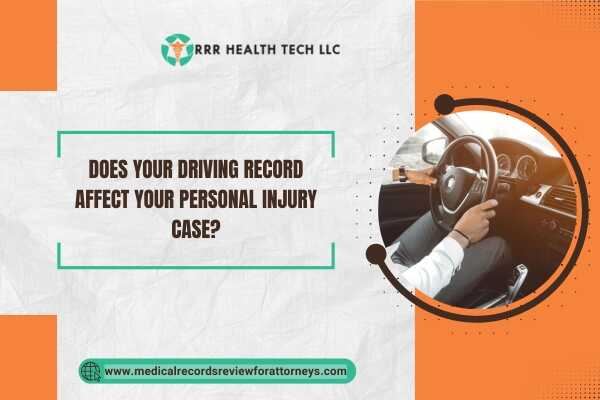
While leveraging a personal injury claim, there are many aspects to consider including the most neglected one, your driving record. Not many are aware on how their driving history can have an impact on their injury case. This article will discuss personal injury claims and driving records with a focus on the medical record review services for lawyers in America.
Introduction
There are numerous implications that come with a trauma injury which includes expense and self-esteem. A significant component that could greatly alter the conditions of the claim is the patient’s individual driving record. This article examines the intricacies of driving records in personal injury cases, the aspects of medical record reviews, and how attorneys use them for case building.
Role of Driving Records in an Injury Case
What Driving Records Entail: Driving records is defined as a formal record highlighting an individual’s driving activities such as licenses obtained, violations, and accidents.
Relativity towards Personal Injury Claim: As a convention, legal and insurance professionals pay great attention to driving records as they evaluate the risks of bearing an accident and calculate damages for the claim.
Considerations under Law: In certain jurisdictions, having a poor driving history may reduce compensation or even nullify a claim altogether.
How Insurance Companies Utilize Driving Records
Determining Responsibility: An insurer may argue that a driver’s history of certain infractions likes speeding or DUI places them in reckless behavior well before the time of the accident
Negligent Behavior: Past infractions may be characterized in such a way as to indicate that the claimant’s conduct caused the accident. This could significantly lower the damages payable.
Pre-existing Injuries: Insurers may argue that due to the claimant’s previous injuries, any alleged injuries liable to the recent accident are best described as pre-existing injuries, not sustained in the accident.
The Importance of a Clean Driving Record
Favorable Evidence: A clean driving history reinforces the presumption of non-negligent behaviour and demonstrates responsible conduct.
Displacement of Liability: Claimants can use this information to shift liability away from them if the other driver possesses a poor driving history.
Strategic Advantage: Claimants with a clean driving record stand to bolster their stance with an insurance company and have a stronger negotiating position.
About Driving Records: Common Myths
Controversy: Minor offenses which might lower the claimant’s credibility should not matter strive to impact perception more than matter rather than serve as active participants.
Miscalculation: Having a clean record is ideal, but it does not guarantee compensation: every clean record is beneficial, but it does not ensure a favorable outcome as other elements are also assessed.
Merit of Medical Records in Personal Injury Claims
Medical Records Review Role: Medical records play a critical role in providing proof of injury from an accident as it helps in establishing the causation, factors, and merit of damages claimed.
Medical Collaboration: Medical record review firms assist lawyers by portraying the critical medical information, providing appropriate analyses, and summary of medical records that, without their work, would not be efficiently presented.
Latest Developments: From 2024, the automation of the process of reviewing medical records has increased accuracy and speed, which has helped attorneys and clients alike.
Case study
Case Study 1:
Overview: The client has never had points deducted from their driving license and was rear-ended by another driver.
Challenges: The insurer sought to prove that the client’s recent minor speeding ticket was evidence of an on-going reckless driving spree.
Solutions: Her attorney placed under oath several professional medical witnesses alongside comprehensive clinical notes to prove the insurer was wrong.
Compensation: The client settled the legal dispute and won a pay-out to fund his medical treatment and work absence.
Case Study 2:
Overview: A client was involved in a multi-car accident and sustained injuries, along with having prior traffic infringement offenses.
Challenges: The insurer said the client’s driving history played a role in the accident.
Solutions: The attorney proved that the medical injuries treated were only pertinent to the case and were unrelated to any prior injury by using relevant medical records.
Compensation: The client received a considerable pay-out, emphasizing again the need for exceptional medical file notes.
Conclusion
An individual’s driving history can adversely affect their personal injury case and profoundly affect liability determinations and settlement values. For personal injury claim attorneys wishing to assist skeleton outlines, surgical assistance services make it critical to understand how to utilize these nuances.
